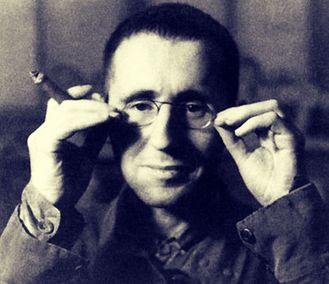|
Editorial Staff
loading...
Bertolt Brecht was one of the most influential playwrights of the 20th century. His works include The Threepenny Opera (1928) with composer Kurt Weill, Mother Courage and Her Children (1941), The Good Person of Szechwan (1943), and The Resistible Rise of Arturo Ui (1958).
Brecht was born in Augsburg, Bavaria, in 1898, and the two world wars straightforwardly influenced his life and works. He wrote poetry when he was a student but studied medicine at the Ludwig Maximilian University of Munich. After military service during World War I, he abandoned his medical studies to pursue writing and the theater.
A member of the Independent Social Democratic Party, Brecht wrote theater criticism for a Socialist daily paper from 1919 to 1921. His plays were restricted in Germany in the 1930s, and in 1933, he went into outcast, first in Denmark and after that Finland. He moved to Santa Monica, California, in 1941, planning to write for Hollywood, yet he drew the consideration of the House Un-American Activities Committee. Despite the fact that he figured out how to redirect allegations of being a Communist, he moved to Switzerland after the hearings. He migrated to East Berlin in 1949 and ran the Berliner Ensemble, a theater organization. As an director, he pushed the "alienation effect" in acting—an approach expected to keep the crowd candidly uninvolved in the predicaments of the characters.
Brecht's verse is gathered in Poems 1913-1956 (1997) and Poetry and Prose: Bertolt Brecht (2003). He composed a wide assortment of verse, including periodic ballads, sonnets he set to music and performed, songs and poems for his plays, personal poems recording tales and considerations, and political sonnets. Writer Michael Hofmann, in "Singing About the Dark Times: The Poetry of Bertolt Brecht" for the Liberal, remarked, “In the course of a mobile, active and engaged life, the poems were the intelligent, compressed, adaptable and self-contained form for both his private and his public address.”
Brecht was influenced by a wide variety of sources including Chinese, Japanese, and Indian theatre, the Elizabethans (especially Shakespeare), Greek tragedy, Büchner, Wedekind, reasonable ground stimulations, the Bavarian folk play, and some more. Such a wide assortment of sources may have demonstrated overpowering for a lesser artist, however Brecht had the uncanny capacity to take components from apparently incongruent sources, consolidate them, and make them his own.."
In his initial plays, Brecht tried different things with dada and expressionism, however in his later work, he built up a style more suited his own one of a kind vision. He loathed the "Aristotelian" drama and its endeavors to draw the observer into a sort of daze like express, an aggregate distinguishing proof with the legend to the point of finish self-insensibility, bringing about sentiments of fear and feel sorry for and, at last, a passionate cleansing. He didn't need his group of onlookers to feel feelings - he needed them to think- - and towards this end, he resolved to obliterate the dramatic fantasy, and, subsequently, that dull daze like state he so disdained.
The consequence of Brecht's examination was a strategy known as "verfremdungseffekt" or the "distance impact". It was intended to urge the crowd to hold their basic separation. His hypotheses brought about various "epic" dramatizations, among them Mother Courage and Her Children which recounts the tale of a voyaging shipper who procures her living by taking after the Swedish and Imperial armed forces with her secured wagon and offering them supplies: dress, sustenance, schnaps, and so forth... As the war develops warmed, Mother Courage finds that this calling has put her and her kids in threat, however the old lady obstinately declines to surrender her wagon. Mother Courage and Her Children was both a triumph and a disappointment for Brecht. Despite the fact that the play was an extraordinary achievement, he never figured out how to accomplish in his group of onlookers the apathetic, logical reaction he fancied. Gatherings of people never neglect to be moved by the predicament of the determined old lady.
In Galileo, Brecht paints a representation of an energetic and tormented man. Galileo has found that the earth is not the focal point of the universe, but rather despite the fact that the Pope's own particular cosmologist has affirmed this world shaking disclosure, the Inquisition has taboo him to distribute his discoveries. For a long time, Galileo holds his tongue. At long last, another pope known for his edification rises to the Papacy, and Galileo sees his possibility. Be that as it may, the Grand Inquisitor is hiding out of sight, plotting to obliterate the colossal stargazer's work.
Brecht would go ahead to compose various present day artful culminations including The Good Person of Szechwan and The Caucasian Chalk Circle. At last, Brecht's crowd persistently continued being moved to dread and pity. In any case, his trials were not a disappointment. His emotional hypotheses have spread over the globe, and he abandoned a gathering of devoted followers referred to today as "Brechtians" who keep on propagating his lessons. At the season of his demise, Brecht was arranging a play in light of Samuel Becket's Waiting for Godot.
Bertolt Brecht died in 1956. He is buried in Berlin.
loading...
0 Comments
|

 RSS Feed
RSS Feed
